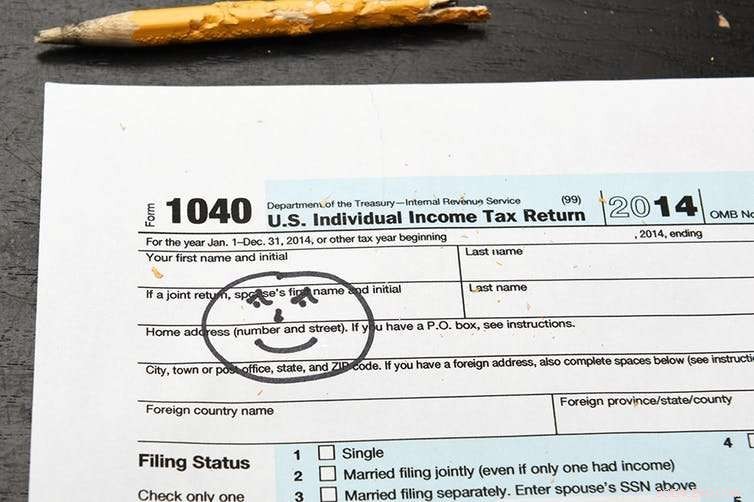
Wetenschap
Waarom belastingverlagingen ons minder gelukkig maken

Terwijl iedereen een hekel heeft aan belastingaangifte, onderzoek suggereert dat meer betalen (mits goed besteed) ons gelukkiger kan maken. Krediet:een katz/Shutterstock.com
Republikeinen hebben onlangs hun belastingplan aangekondigd en hopen dit vóór Thanksgiving in wet om te zetten. Terwijl details in beweging zijn, het zou waarschijnlijk de successierechten afschaffen, de hoogste marginale rente verlagen en de bedrijfstarieven verlagen, produceren, in totaal, wat de president een "gigantische" belastingverlaging heeft genoemd.
Elk van deze elementen, indien geslaagd, zou de belastingcode minder progressief maken en de overheidsinkomsten verminderen op een manier die het uiteindelijk moeilijker maakt om voor programma's en diensten te betalen. Aangezien het doel van het overheidsbeleid moet zijn het leven en het welzijn van de burgers te verbeteren, de voor de hand liggende vraag om te overwegen bij de evaluatie van dit plan is of het dat doet. Of anders gezegd, zal het belastingplan de meeste Amerikanen gelukkiger maken?
Onderzoek naar gelukseconomie suggereert twee gezichtspunten om te gebruiken bij het overwegen van deze vraag.
De eerste betreft hoe progressief een belastingstelsel is. Simpel gezegd, zijn samenlevingen gelukkiger als de rijken een evenredig groter deel van de belastingen dragen? De tweede is het totale belastingniveau. Dat is, of hogere belastingen mensen meer of minder gelukkig maken omdat de overheid meer van hun inkomsten aftrekt en uitgeeft aan diensten zoals gezondheidszorg of infrastructuur.
Laten we ze een voor een bekijken.
Het belang van 'belastingmoraal'
Een recent artikel in het peer-reviewed tijdschrift psychologische wetenschap suggereert dat landen met een progressiever belastingstelsel in feite gelukkiger zijn dan landen met vlakkere belastingtarieven.
In dit stuk, drie psychologen vergelijken de progressiviteit van het belastingstelsel van een land met verschillende maatstaven voor geluk. Ze vinden duidelijk en ondubbelzinnig bewijs dat progressieve belastingen 'positief geassocieerd zijn met subjectief welzijn'. Met andere woorden, de burgers van een land zijn gelukkiger als de rijken een groter deel van de belastingen dragen.
Deze conclusie geldt niet alleen bij het gebruik van eenvoudige correlaties. Het geldt ook onder geavanceerde statistische analyses die controleren voor andere nationale factoren, zoals het BBP per hoofd van de bevolking en inkomensongelijkheid, evenals voor individuele factoren zoals inkomen, geslacht, leeftijd en burgerlijke staat.
Een reden hiervoor is dat het verband tussen inkomen en geluk het sterkst is voor de armen en middenklasse. Nobelprijswinnaars Angus Deaton en Daniel Kahneman toonden aan dat geluk toeneemt met het inkomen tot een bepaalde drempel wordt bereikt waarbij de opbrengsten in termen van welzijn geleidelijk afnemen. Dat betekent dat hoewel het inkomen dat verloren gaat aan belastingen de armen en de middenklasse schaadt – die de neiging hebben om het grootste deel van wat ze verdienen uit te geven – het de welgestelden niet hindert – wier tevredenheid met het leven veel minder wordt beïnvloed door een marginale verhoging van de belastingdruk.
Een andere reden zou kunnen zijn wat geleerden 'belastingmoraal' noemen. Dit verwijst naar de mate waarin mensen een morele verplichting aanvaarden om belasting te betalen als hun bijdrage aan de samenleving. Beurtelings, dit impliceert de overtuiging dat een belastingstelsel eerlijk is.
Uit bestaand onderzoek blijkt duidelijk, en gezond verstand suggereert, dat het belastingmoraal hoger is naarmate een systeem progressiever is - dat wil zeggen, een "eerlijk" systeem is er een waarin de rijken een onevenredig deel betalen - en dat mensen met een hoger belastingmoraal gelukkiger zijn. Dus, logisch, als progressieve belasting de belastingmoraal verhoogt, en het belastingmoraal verhoogt het geluk, meer progressieve belastingen betekenen hogere niveaus van geluk.
Dit is geen goed nieuws voor Amerikanen, echter.
Het Amerikaanse belastingstelsel is een van de minst progressieve in de westerse wereld en is aanzienlijk minder dan een paar decennia geleden.
And this is also bad news for the Republican tax plan – if the GOP and President Donald Trump want to make Americans happier.
The highly respected Tax Policy Center's detailed analysis of the plan shows that benefits are heavily skewed toward the wealthiest. The current proposal will benefit the 1 percent handsomely, increasing their incomes by more than 8 percent. Meanwhile the working and middle classes receive minimal benefits, if any – and they may even see their taxes increase.
While nothing is certain until the ink is dry, their bill most likely will result in a more regressive tax system that likely will make most Americans less happy.
What taxes do
But what about connection between the total tax burden and the national level of happiness?
Surely no one likes being taxed, but taxation is the mechanism by which society provides a great many things that people do like, such as Medicare, Medicaid and Social Security, not to mention good schools, good roads and safe neighborhoods.
"Big government" programs benefit everyone for the obvious reason that they reduce poverty and alienation, thus lowering the social problems such as crime and suicide that these conditions produce.
Beurtelings, it seems obvious that virtually all people, regardless of social class or political ideology, are happier when there is less poverty and less insecurity. Much peer-reviewed academic research has documented just that.
Whether looking across countries or across U.S. states, people – both rich and poor – tend to be happier in places where government provides a greater array of social protections and services. Hence, the closer we approach what Europeans call social democracy – and Americans call New Deal programs – the more people tend to find life satisfying.
If taxpayer-funded government programs make people happy, then we should find a link between the level of tax burden and happiness. And in fact, that's what we find by examining a wide range of countries in the Western world.
Bijvoorbeeld, Denmark, generally considered the world's happiest country, also has the highest tax burden of any of industrial democracy, with about half of all income going to the tax man in 2014. Conversely, the least happy are also the least taxed, namely South Korea and Turkey, which pay 25 percent and 15 percent, respectievelijk. Nog, despite their low taxes, South Korea ranks just 58th in happiness, between Moldova and Romania, while Turkey ranks even lower at 69th, just below Libya.
We cannot of course generalize from a few examples, nor can we assume that taxation (and the spending taxation allows) are the only causes of happiness. To make strong claims about the nexus between taxation and well-being requires the rigorous and systematic analysis found in the peer-reviewed academic literature.
In "The Political Economy of Human Happiness, " one of us (Radcliff) examined individual-level data on 21 countries over three decades and found that people are happier as tax burden increases.
This held even when accounting for other factors known to affect happiness such as income, Gezondheid, arbeidsstatus, geslacht, leeftijd, ras, opleiding, religion and so on. evenzo, the national or aggregate level of happiness went up or down with the level of taxation (again, controlling for other factors).
The same positive connection between tax burden and happiness was reported in a 2011 paper, while another article found that life satisfaction varies positively with the total amount of governmental "consumption" of the economy, that is the level of taxation.
The price of a 'civilized society'
While details of the Republican tax plan could change drastically, it is certain to reflect core Republican values like lowering tax rates and smaller government.
Republicans tend to favor a flat tax because they argue it's fairer. And they want to reduce the tax burden overall because they think people are better off with more money in their pockets and fewer government services. Scholarly research by us and others suggest they are wrong on both counts, at least in so far as human happiness is concerned.
The familiar aphorism, usually attributed to Justice Oliver Wendell Holmes, notes that "taxes are the price we pay for a civilized society, " a sentiment chiseled into the side of the IRS building.
We believe research into the economics of happiness would take this sentiment one step farther:Taxes are the price we pay for a happy society.
Dit artikel is oorspronkelijk gepubliceerd op The Conversation. Lees het originele artikel. 
 Mumbai is mogelijk kwetsbaar voor toekomstige orkanen
Mumbai is mogelijk kwetsbaar voor toekomstige orkanen Vulkaan in Papoea-Nieuw-Guinea weinig bekend, moeilijk te voorspellen
Vulkaan in Papoea-Nieuw-Guinea weinig bekend, moeilijk te voorspellen Ontbossing in Brazilië zal moeilijk te stoppen zijn, maakt niet uit wie de leiding heeft
Ontbossing in Brazilië zal moeilijk te stoppen zijn, maakt niet uit wie de leiding heeft Extreme hitte treft een derde van de Afrikaanse stedelijke bevolking
Extreme hitte treft een derde van de Afrikaanse stedelijke bevolking Overuren, hinderlijke wateroverlast kan meer kosten dan extreme, zeldzame gebeurtenissen
Overuren, hinderlijke wateroverlast kan meer kosten dan extreme, zeldzame gebeurtenissen
Hoofdlijnen
- Wat gebeurt er met een dierlijke cel in een hypotone oplossing?
- Het korstmos dat zijn voortplantingsstrategie verandert afhankelijk van het klimaat
- Genetici ontdekken twee verschillende manieren om transcriptie te beëindigen
- Door het bedrijf gesponsorde klinische CRISPR-onderzoeken starten in 2018
- 5 manieren om geluk te maximaliseren
- Wilt u 41 procent van de zeer bedreigde gewervelde planeten redden? Werken op eilanden
- De structuur en functie van ribosomen in eukaryoten en prokaryoten
- Prokaryotische celstructuur
- Het simuleren van seks met walvisachtigen met kadaverdelen biedt inzicht in mariene copulatie
- Waarom rijke ouders eerder onethisch zijn?

- Twee nieuwe oude soorten kakkerlakken gevonden in grot in Myanmar

- Nieuw boek onthult de culturele impact van Charles Darwin in ongekend detail

- Missen we de waarschuwingssignalen om eenzame terroristische aanslagen te voorkomen?

- Complementaire vibrationele spectroscopische technieken die worden gebruikt om oude verbrande botten te testen

 Organellen gevonden in beide planten- en bacteriecellen
Organellen gevonden in beide planten- en bacteriecellen April Fools hoax-verhalen kunnen aanwijzingen bieden om nepnieuws te identificeren
April Fools hoax-verhalen kunnen aanwijzingen bieden om nepnieuws te identificeren Neerslag in Centraal-Azië gevormd door de temperatuur van het zeeoppervlak boven de tropische Stille Oceaan en de Noord-Atlantische Oceaan
Neerslag in Centraal-Azië gevormd door de temperatuur van het zeeoppervlak boven de tropische Stille Oceaan en de Noord-Atlantische Oceaan Project levert goedkope toekomstige netwerkarchitectuur voor mobiele operators
Project levert goedkope toekomstige netwerkarchitectuur voor mobiele operators Antropologen bevestigen het bestaan van een gespecialiseerd jachtkamp voor schapen in het prehistorische Libanon
Antropologen bevestigen het bestaan van een gespecialiseerd jachtkamp voor schapen in het prehistorische Libanon Neurotische studenten kunnen baat hebben bij gezondheidsvoorlichting
Neurotische studenten kunnen baat hebben bij gezondheidsvoorlichting Een glas whisky kan je helpen om diep in de tijd te komen
Een glas whisky kan je helpen om diep in de tijd te komen Nobelprijs voor scheikunde eert groenere manier om moleculen te bouwen
Nobelprijs voor scheikunde eert groenere manier om moleculen te bouwen
- Elektronica
- Biologie
- Zonsverduistering
- Wiskunde
- French | Italian | Spanish | Portuguese | Swedish | German | Dutch | Danish | Norway |

-
Wetenschap © https://nl.scienceaq.com

